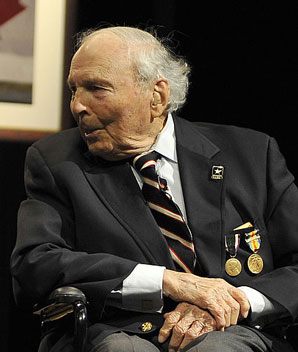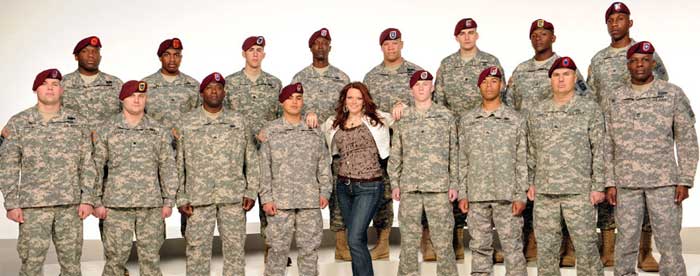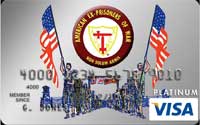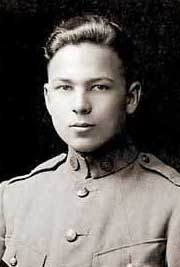 |
American Ex-Prisoners of War
A not-for-profit, Congressionally-chartered veterans’ service organization advocating for former prisoners of war and their families.
Established April 14, 1942
|
| search engine by free find | advanced |
| "The Tragedy of Bataan" is a 30-minute television documentary and five-part radio series that chronicles the fall of the Philippines and the Bataan Death March in the early months of World War II.
The show is narrated by actor Alec Baldwin and features first-account interviews with twenty-two former survivors of the conflict. This poignant story is also told through several unpublished diaries and never-before seen propaganda footage. "The Tragedy of Bataan" will air on PBS stations around the country starting Veterans Day (in Knoxville, TN, among other cities), and showings will continue into next year. A number of locales will air the documentary on and around Dec. 7, the 70th Anniversary of the beginning of World War II. Check local listings for time and station information. |
The documentary was written, directed and produced by Jan Thompson, a veteran producer of over 300 television programs. Thompson has been nominated for nine EMMys and has won two. The show's opening animation was created by Jay Carey.
"The Tragedy of Bataan" is the first in a series of documentaries that will chronicle the men that were surrendered to the Imperial Japanese and subsequentially became prisoners-of-war. More information about the making of "The Tragedy of Bataan," other interesting background information and profiles of the show's creators can be found at www.tragedyofbataan.com. This site also contains a short video trailer for viewing. |
AXPOW testimony to the Joint House and Senate Veterans' Affairs Committees Hearing to Receive Legislative Presentations of PVA, AFSA, MOPH, NASDVA, WWP, VVA, TREA, and AXPOW.
Statement of Morris Barker, National Commander, American Ex-Prisoners of War, as presented by Charles Susino, Junior Vice Commander. |
|
Messrs. Chairmen and Members of the Veterans’ Affairs Committees:
My name is Charles Susino, Junior Vice Commander of the American Ex-Prisoners of War. I am honored to testify before you today on behalf of National Commander Morris Barker. Before I begin, I want to thank Senator Burr for introducing the Resolution creating March 30, 2011 as "Welcome Home Vietnam Veterans Day". On March 30, 1973, all U.S. troops withdrew from Vietnam under the terms of the Treaty of Paris. This Resolution encourages Americans across the country to recognize Vietnam veterans for their sacrifice and demonstrate a warm welcome to these soldiers who returned from war to a politically divided country. As I returned home from World War II, the support of a grateful nation helped immensely with my recovery and return to civilian life. Thank you, Senator. Senator Murray, Senator Burr, Representative Miller and Representative Filner, I congratulate you on your leadership roles in this new 112th Congress; I wish you and your colleagues heartfelt best wishes as you grapple with providing for America's veterans, their families and survivors. This year marks the 69th birthday of the American Ex-Prisoners of War. On April 14, 1942, two mothers whose sons had been captured on Bataan formed the Bataan Relief Organization; in 1945, after the POWs returned home, we became the Bataan Veterans Organization; and in 1949, expanding our membership to encompass ALL former prisoners of war from ALL wars, we became the American Ex-Prisoners of War. At that time, there were more than 116,000 ex-POWs alive. In 1987, when President Ronald Reagan wrote the Proclamation commemorating National Former Prisoner of War Recognition Day, he stated:
Today, just 24 years later, there are less than 16,000 former prisoners of war alive FROM ALL WARS -- WWI, WWII, Korea, Vietnam and Post-Vietnam. Soon the concerns of this tiny group of heroes will matter not to this committee or any other. On February 27th, the American Ex-Prisoners of War lost their oldest member. Frank Woodruff Buckles, of West Virginia died at the age of 110. At 16, the Marines told him he was too young and too skinny, and the Navy told him he was flat-footed, so he lied to the Army recruiter about his age and entered service in World War I. As his oral and written history in the Library of Congress details, after the Armistice was signed, he acted as Army escort taking POWs back to Germany. His WWI discharge papers as a Corporal were dated 11/13/1919. But in addition to his service in World War I, Mr. Buckles went to work for the White Star steamship line in the 1930s and 1940s. After stints in Canada and NY, he was living in the Port of Manila, The Philippines. He was captured by the Japanese shortly after Pearl Harbor, was held at Santo Tomas and Los Banos for 3 years, 2 months and joined more than 14,000 civilians caught up in World War II. Some of our youngest members are in their early thirties; however instead of 116,000, as in the past, we're talking of just 23 former POWs from current conflicts. We are immensely grateful for past Congressional actions to help ex-POWs. It was our organization who pushed in the early 1980s for "Presumptives" and because of the efforts of your committees, the Veterans Administration and the heroes in red jackets walking the halls of Congress telling the stories of former prisoners of war, we now have benefits and entitlements that protect us...and the POWs that will surely come after we are gone. We thank you for all you have done for us. And we especially thank the 111th Congress for passage of The Caregivers and Veterans Omnibus Health Services Act giving severely wounded warriors and the family members who care for them some much-needed support to ensure the warriors receive the highest quality of care available and remain out of nursing homes. Senator Murray, I know your office has been especially vigilant with the Veterans Administration on the implementation of this new law.As we look to the future, we want to lend our small voice and support to our brother Veterans Service Organizations. Our numbers may be dwindling, yet our commitment to living up to our slogan "We exist to help those who cannot help themselves" remains strong. We join the American Legion, MOAA and the DAV in supporting S-344. The Retired Pay Restoration Act of 2011. Passage of this bill would authorize full concurrent receipt of retired pay and veterans' disability compensation for all disabled military retirees. Under current law, only a disability rated at 50% or more is considered. It makes the veteran eligible for the full concurrent receipt of both veterans' disability compensation and either military retired pay or combat-related special pay those individuals who were retired or separated from military service due to a service-connected disability. I understand this bill has been referred to the Committee on Armed Services. S-260. This would repeal the deduction of VA survivor benefits from Survivor Benefit Plan (SBP) annuities. It prohibits recoupment by the Secretary of Defense (DOD) of certain amounts previously paid to SBP recipients in the form of a retired pay refund. And it repeals the optional authority of (and instead requires) the Secretary of the military department concerned to pay an annuity to a member's dependent children when there is no eligible surviving spouse. Directs the Secretary concerned to restore annuity eligibility to a surviving spouse who earlier agreed to transfer such eligibility to a surviving child or children of a member. This bill, as well, is in the Committee on Armed Services. The DAV is supporting a bill for former prisoners of war. S-68 authorizes use of Department of Defense (DOD) commissary and exchange stores by former prisoners of war who have been honorably separated from service and have a service-connected disability rated at 30% or more. We lend our support to this bill. We join with DAV in support of S-67, which directs the Secretary of Defense (DOD) to permit any former member of the armed forces who is entitled to compensation for a service-connected disability rated total by the Secretary of Veterans Affairs (VA) to travel on military aircraft to the same extent as retired members of the Armed Forces. And we join our small voice to the millions of other voices in our brother VSOs who are working to ensure full and adequate funding for the Department of Veterans Affairs (VA). Caring for the casualties of America's conflicts is a fundamental part of who we are as veterans. We are aware of the budget concerns within this new Congress; however it would be unacceptable to the 23 million veterans* alive to allow this burden to fall on the shoulders of those who have already given so much. We believe that as our increasing veteran population and the increasing age of many of our veterans, we need to keep pace to ensure they are not financially harmed for their sacrifices. We believe this is a debt to be paid willingly, if not enthusiastically. I would like to personally thank Senate Veterans’ Affairs Committee Chairman, Senator Patty Murray, for her recent statement on the President's 2012 budget request for veterans programs. The President’s budget requests an increase of approximately $2.7 billion for VA health care over current year VA funding in a very difficult budget year.
Messrs. Chairmen and Committeemen, this completes my testimony. Thank you for allowing me the opportunity to appear before you on behalf of the American Ex-Prisoners of War to share our goals for the 112th Congress. Thank you also for all that your Committees have done and for all that you will do for our nation's veterans and their families in the future. God bless America. *2009 est. |
|
Last Doughboy Laid to Rest at Arlington
|
| by Alice A. Booher
Frank Woodruff Buckles was buried at Arlington National Cemetery on March 15 with full honors . The oldest member of the American Ex-Prisoners of War and the last Amereican veteran of WWI, passed away on February 27, 2011, at his home in Charles Town, West Virginia. The full 110 years of his life were nothing less than remarkable. On learning of his death, his small town fellow-occupants remarked on how down-to-earth he was, how generous, how affable. Frank Buckles was born February 1, 1901. Buckles shipped out with 102 men of the 1st Ft. Riley (KS) Casual Detachment to England On April 12, 1917 on the HMS Carpathia. (Some of those onboard had been on the ship when it had picked up survivors of the HMS Titanic on April 12.) Initially, the unit replaced the 6th Marines, but he then drove motorcycles, cars and ambulances in the Gironde area, St. Andre de Cubzac, Basens, Bordeaux and St. Sulpice, an area of great warehouses and a camp for German POWs. In his oral and written history in the Library of Congress, he recalled after the Armistice was signed, acting as Army escort taking POWs back to Germany. On one such trip, he was on the train, got out to stretch and missed the coach, so he road in the boxcar with the German POWs, one of whom he would later meet in Brazil. He recalled other stories about guarding the German POWs in France, including one when another soldier was guarding the POWsby himself on a payday, got drunk on local Cognac, and was hauled back into camp by the POWs in a wheelbarrow with another POW following, holding his rifle.
| After release, and returning to the states, Buckles married Audrey Mayo in 1946 and in 1954 they settled in Charlestown, WV on a farm his ancestors had owned since 1732 (overlooking Civil War sites Antietam and Harpers Ferry). After WWI he was not recognized much as a veteran, but after WWII, he used VA educational benefits at business school, and later VA medical benefits including hearing aids.
After the war, Buckles went with the 7th Regiment of NY, C Co. and became a staunch advocate for veterans and active in veterans organizations. Buckles served as National Commander of the Veterans of WWI of the USA, Inc. a Congressionally chartered Veterans Service Organization founded in 1949 and encouraged its publication The Torch. In recent years, more often than not, on Veterans (or Memorial) Day, it would be Frank Buckles� photo on the front page of the newspaper sitting erect in his wooden wheelchair, with tartan lap robe and uniform coat, giving a smart salute to pay his respects at Pershing�s gravesite in Arlington National Cemetery. On one such visit, Buckles was shown the small WWI memorial for DC veterans, and thereafter, he became the spokesperson and personal impetus on The Hill, Press and elsewhere for creating a WWI Memorial for all participants. A well read man in a number of languages, after his wife�s death in 1999, he took comfort in his some 1,000 books, while continuing to work his 330 acre cattle farm (Gap View Farm). His daughter, Susannah Flanagan, lives in northern Virginia. 
wiki/File:Gates-Buckles.jpg Public Domain, Link
Buckles continued to mow his hay fields with his John Deere tractors when invited to be the Grand Marshall of the 2007 Memorial Day Parade in Washington, D.C., at which time he was able to tell his story to the media. He recalled an earlier visit to Washington in 1999 to the French Embassy where President Jacques Chirac awarded him and 3 others the Legion of Honor. A Pentagon�s special WWI exhibit opened on his 107th birthday. Since an Armistice party on The Hill in June 2008, and as a practical viable alternative, Buckles had spoken for the WWI Memorial for DC being restored with federal status. A veteran to serve an example. |
Country Artist Jamie Tate's Message to Men and Women in Uniform
|
| Jamie Tate originally wrote her new song I�ll Give My All simply to show some support for the troops, but the song has since taken on a bigger role.
I�ll Give My All is engaged in a promotion aimed at distributing downloads to one million current and former service men and women around the world�for free. Every download will result in a donation to the Wounded Warrior Project, the USO of North Carolina and the Military Family Lifestyle Charitable Foundation. |
Jamie had some very special help making the recording: from the 82nd Airborne All-American Chorus. When the world-renowned group from Fort Bragg heard her song, they offered to lend their own voices.
The result is a stirring tribute to the sacrifice our men and women have made, and continue to make, every day. Click the player below to hear Jamie and the 82nd Airborne All-American Chorus performing I�ll Give My All. And CLICK HERE to download your free copy of I�ll Give My All to your computer. Every download helps our troops and says �Thank You!� in a special way for all their sacrifices. |
|
ALS BENEFITS FROM VA
Dear Abby:
In May 2001, you printed my letter alerting former prisoners of war and their widows to the special veterans' benefits available to them from the Department of Veterans Affairs. The response was great; many former POWs and their dependents now have their VA benefits because of that column. Now, as chairman of VA outreach for American Ex-Prisoners of War, I write to alert all veterans (not just former POWs) of a recent VA ruling. On Sept. 23, 2008, Lou Gehrig's disease, amyotrophic lateral sclerosis, was made a presumptive condition for all veterans who served in our armed forces for at least 90 days. This means that the widows of those veterans who died of Lou Gehrig's disease in years past are eligible for the VA widows' monthly benefit, which is very substantial. Many people are not aware that a veteran's death due to this disease is now considered service-connected. One claim I handled recently involved an ALS death 46 years ago, in 1963. Thank you for your help in getting the word out, Abby. Fred Campbell, American Ex-Prisoners of War Dear Fred:
I'm pleased to help you and America's veterans once again. From The Federal Register, Sept. 23, 2008: Veterans with amyotrophic lateral sclerosis (ALS) may receive badly needed support for themselves and their families after the Department of Veterans Affairs (VA) announced today that ALS will become a presumptively compensable illness for all veterans with 90 days or more of continuously active service in the military. "Veterans are developing ALS in rates higher than the general population, and it was appropriate to take action," Secretary of Veterans Affairs Dr. James B. Peake said. He based his decision primarily on a November 2006 report by the National Academy of Sciences' Institute of Medicine (IOM) on the association between active-duty service and ALS. The new interim final regulation applies to all applications for benefits received by VA on or after September 23, 2008, or that are pending before VA, the United States Court of Appeals for Veterans Claims, or the United States Court of Appeals for the Federal Circuit on that date. For a listing of American Ex-Prisoners of War National Service Officers, click here.
For a listing of Paralyzed Veterans of America National Service Officers Service Officers, click here: To download Department of Veterans Affairs VA Form 21-534, click here: |
Find Them and Help Them
Many American Ex-prisoners of war are unaware of their entitlements. We can do them a great service if we can find them. The Veteran's Administration estimates that 32,550 Ex-POWs were alive as of December, 2004 (the last year statistics were published). This was a drop of 10% from 2003. If we estimate declines of 10% for 2005, 2006 and 2007, there are fewer than 23,000 alive in 2008. We also know there are fewer than 10,000 who are members of our organization at this time. We need to continue to encourage VA to help in our quest to find both living POWs and their dependents so that they can claim the entitlements they deserve. Fred Campbell of San Angelo, TX is the chairman of AXPOW’s Outreach Committee. Please contact him if you know of a POW or widow who is not receiving VA benefits. His articles appear monthly in the EX-POW Bulletin.
Legislation has made significant changes to benefits and health care available through the Veteran's Administration. Veterans who have not recently sought services from the VA should contact a National Service Officer (Click here for NSO directory) or the VA to explore which VA resources are available to them. Other benefits, besides medical, available to eligible veterans include: disability compensation, pensions, education and training, vocational rehabilitation, home loan guarantees, life insurance, burial, survivors' assistance and dependents' education. |
There are homeless veterans programs and benefits for special groups, such as blinded veterans, veterans with spinal cord injuries and veterans in need of prosthetic services.
Save Your Oral History
Please consider saving your oral history, memoirs, diary, and/or letters home. By leaving your oral history you will have done your country another good deed. You will serve future generations as they strive to understand their world.
Click here for some excellent advice from noted historian Stephen Ambrose on how to start preserving your history. |
| Copyright © 2012. All rights reserved. The documents on this site are owned by the American Ex-Prisoners of War. Copying any materials on this site is expressly forbidden without the organization's express written permission in individual instances. Republication is forbidden in order to avoid the creation of adulterated or obsolete versions, as well as unauthorized commercial exploitation. |

 in Missouri. When he was 16, the Marines told him he was too young and too skinny, and the Navy told him he was flat-footed. So he lied to the Army recruiter in order to enter the service.
in Missouri. When he was 16, the Marines told him he was too young and too skinny, and the Navy told him he was flat-footed. So he lied to the Army recruiter in order to enter the service.